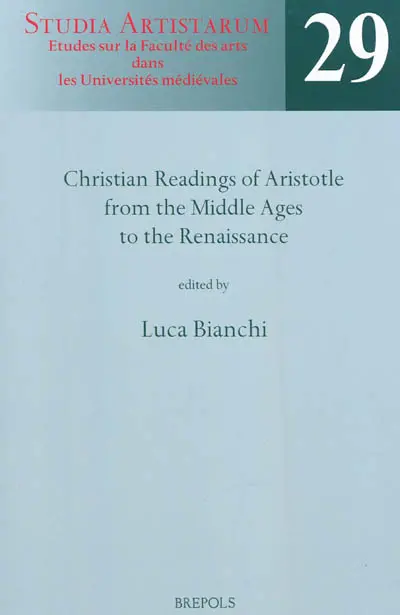en savoir plus

Permet à tous ses détenteurs d'obtenir 5% de réduction sur tous les livres lors du retrait en magasin (réduction non cumulable avec les réductions de type étudiant).
Offre également un certain nombre d'avantages auprès de nos partenaires.
Avec les favoris, retrouvez dans un espace les sélections effectuées au fur et à mesure de vos navigations dans le site.
Constituez pour votre usage personnel vos listes de livres en prévisions d'achats futurs et votre sélection d'articles, dossiers, événements, vidéos ou podcasts préférés ou à découvrir plus tard...
Il suffit simplement de cliquer sur "Ajout Favori" sur chaque page qui vous intéresse pour les retrouver ensuite dans votre espace personnel.
Requiert un compte Mollat
Requiert un compte Mollat
Christian readings of Aristotle from the Middle Ages to the Renaissance
en savoir plus
Résumé
Issues d'une conférence tenue à l'Université du Piémont oriental en 2009, ces contributions ont pour objet d'étudier les lectures chrétiennes de la philosophie d'Artistote au Moyen Age et à la Renaissance en se penchant plus spécifiquement sur ses travaux autour de l'exégèse. ©Electre 2026
Quatrième de couverture
Widely recognized as one of the main characteristics of Latin Aristotelianism, the 'Christianisation' of Aristotle from the thirteenth to the seventeenth century has received as yet little attention. Aiming to answer the need for a more systematic investigation, the articles here collected approach Christian readings of the Stagirite's works from different perspectives. Setting aside abstract discussions about 'degrees of orthodoxy', they address a few specific questions: which 'images' of Aristotle were offered by Medieval and Renaissance interpreters, and in particular how did some of them argue that - far from being a pagan or even an impious thinker - he did not contradict the truths revealed by Holy Scripture? Which strategies did they adopt to harmonize Aristotelian philosophy with Christian religion, or at least to avoid their clash? How did they conceive the task of expounding Aristotle's thought? How did they understand and apply the distinctions, developed since the mid-thirteenth century, between the point of view of the philosophers and that of the believers, between what is true 'speaking naturally' and what is true 'according to faith'? Were these distinctions - and other disclaimers or cautionary statements - effective in protecting masters that taught Aristotle's texts from accusations of heresy? To what extent were ideas issuing from Christian theology integrated within the Peripatetic worldview, or even treated within Aristotelian commentaries?
Discussing these and related questions, the ten contributors to this volume examine relevant doctrines of outstanding thinkers - Roger Bacon (Chiara Crisciani), Siger of Brabant and Henry of Ghent (Pasquale Porro), Dante Alighieri (Gianfranco Fioravanti); offer a fine analysis of some commentaries on the Nicomachean Ethics (Iacopo Costa), the Politics (Stefano Simonetta) and the libri naturales (Amos Corbini); suggest innovative interpretations of the genesis of the Liber de bona fortuna (Valérie Cordonier) and of the condemnation of 1277 (Dragos Calma); inspect minor but significant figures of the Italian Renaissance such as Ludovico Beccadelli (Pietro Rossi) and Cesare Crivellati (Luca Bianchi).
Fiche Technique
Paru le : 15/10/2011
Thématique : Textes des Philosophes
Auteur(s) : Non précisé.
Éditeur(s) :
Brepols
Collection(s) : Studia artistarum
Contributeur(s) : Editeur scientifique (ou intellectuel) : Luca Bianchi
Série(s) : Non précisé.
ISBN : 978-2-503-54237-9
EAN13 : 9782503542379
Reliure : Broché
Pages : 442
Hauteur: 24.0 cm / Largeur 16.0 cm
Poids: 0 g

